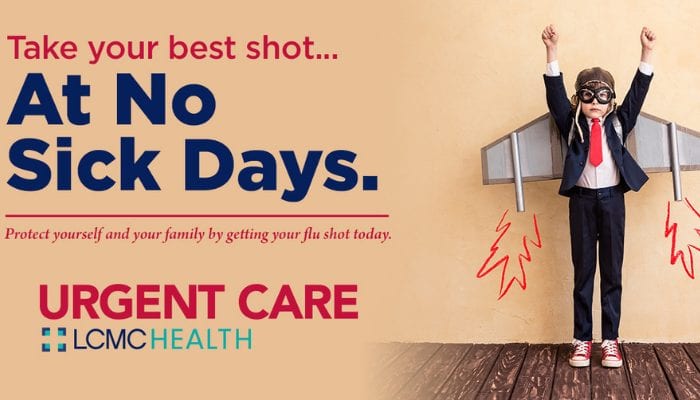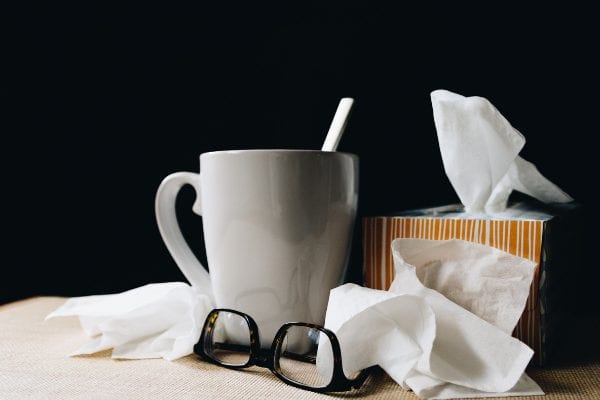Disclosure :: This post is sponsored by our friends at Urgent Care :: LCMC Health.
Do I Have a Cold or the Flu and What Can I Do to Protect my Family?
Flu season is right around the corner and that means those nasty little bugs that cause this serious illness are lurking on doorknobs, your phone and the hand of the co-worker you shook yesterday.
Last year in Louisiana, the flu season was one of the worst in recent history. So, in preparation for 2018, we’re here to help offer some advice on how to minimize the dangers of the flu and keep yourself and those you love safe.
 The flu and the common cold are both respiratory illnesses, but they are caused by different viruses.
The flu and the common cold are both respiratory illnesses, but they are caused by different viruses.
In addition, these two types of illnesses have similar symptoms, which can make it hard to distinguish between the two, especially during the early stages. In fact, it can be difficult (or even impossible) to tell the difference between them based on symptoms alone. If you feel that you are ill, special tests that usually must be done within the first few days of illness can tell if you have the flu. The flu often includes fever and chills, cough, sore throat, runny or stuffy nose, muscle or body aches, headaches and fatigue. Cold symptoms are usually milder usually consisting of a runny or stuffy nose.
The best way to keep from coming down with the flu is to get vaccinated.
It’s recommended to get vaccinated before flu activity begins in your community, which is usually by the end of October or early November here in Louisiana. The vaccine can keep you from contracting the flu, or in many cases reduces flu illnesses, so the symptoms are much milder. It is very important to vaccinate high-risk persons such as young children, pregnant women, people with chronic health conditions like asthma, diabetes or heart and lung disease, and those over 65. If a high-risk individual contracts the flu, it can bring about severe complications potentially including death. Infants younger than six months are at high risk of serious flu illness, but are too young to be vaccinated. However, studies have shown that flu vaccination of the mother during pregnancy can protect the baby after birth from flu infection for several months. People who live with or care for infants should be vaccinated.
 Even if you get a vaccine, be sure to take everyday precautions to keep the flu away.
Even if you get a vaccine, be sure to take everyday precautions to keep the flu away.
Wash your hands frequently, cover your mouth when you cough and if someone in the family comes down with symptoms, isolate that person from other family members if possible. Additionally, see a doctor as soon as symptoms occur. The treatment window for the flu is usually within the first 48 hours of the onset of symptoms, and the only proven treatment that helps requires a doctor’s prescription, so it’s important to act fast.
“It only takes a few minutes to get a vaccination and then you’re set for the season,” says, Dr. Patrick Dennis. “I’ve talked to so many people in the past who did not get a flu shot and then come down with the virus. They regret not taking the time to get the shot because not only did they feel horrible, but they also missed time at work or at school.”
LCMC Health Urgent Care provides flu shots for ages nine years and up, as well as walk-in care for colds and flu.
Here in the New Orleans area, LCMC Health Urgent Care has three convenient, walk-in clinics to help protect you and your family from the flu, or treat you if you’re one of the many who come down with it. Our locations in Lakeview (826 Harrison Ave. Ste. A), Gretna (2600 Belle Chase, Hwy B-2) and Luling (107 Maryland Dr.) are open 7 days a week. Clinic hours are 8:00am to 8:00pm {Monday through Friday} and 8:00am to 5:00pm {Saturday and Sunday}. Our reach also extends to the Covington area with our LCMC Health affiliate Lake Urgent Care Northshore. For more information, visit our website.
Website | Facebook | Twitter

















